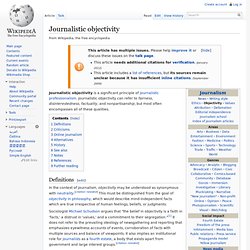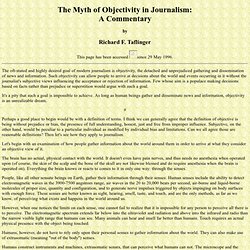

Objectivity (journalism) Journalistic objectivity is a significant principle of journalistic professionalism.

Journalistic objectivity can refer to fairness, disinterestedness, factuality, and nonpartisanship, but most often encompasses all of these qualities. Definitions[edit] Sociologist Michael Schudson argues that "the belief in objectivity is a faith in 'facts,' a distrust in 'values,' and a commitment to their segregation. "[1] It does not refer to the prevailing ideology of newsgathering and reporting that emphasizes eyewitness accounts of events, corroboration of facts with multiple sources and balance of viewpoints. Criticisms[edit] Advocacy journalists and civic journalists criticize the understanding of objectivity as neutrality or nonpartisanship, arguing that it does a disservice to the public because it fails to attempt to find truth. Historical (including social and cultural) factors have also shaped objectivity in journalism, as acknowledged and addressed in peace journalism.
Alternatives[edit] Bob Schieffer, Ron Paul and journalistic "objectivity" - Glenn Greenwald. CBS News‘s Bob Schieffer is the classic American establishment TV journalist: unfailingly deferential to the politically powerful personalities who parade before him, and religiously devoted to what he considers his own “objectivity,” which ostensibly requires that he never let his personal opinions affect or be revealed by his journalism.

Watch how thoroughly and even proudly he dispenses with both of those traits when interviewing Ron Paul last Sunday on Face the Nation regarding Paul’s foreign policy views. You actually believe 9/11 was America’s fault? Your plan to deal with the Iranian nuclear program is to be nicer to Iran? This interview is worth highlighting because it is a vivid case underscoring several points about the real meaning of the much-vaunted “journalistic objectivity”: (2) When it comes to views not shared by the leadership of the two parties, as in the above excerpt from the Paul interview, everything changes.
Objectivity in Journalism. DAVID BROOKS There is some dispute about whether objectivity can really exist.

How do we know the truth? Well, I’m not a relativist on the subject. I think there is truth out there and that objectivity is like virtue; it's the thing you always fall short of, but the thing you always strive toward. And by the way, I think that opinion journalists have to be objective just as much as straight reporters. Opinion journalists, too, have to be able to see reality wholly and truly. Public Journalism and the Problem of Objectivity.
The Myth of Objectivity in Journalism. By This page has been accessed since 29 May 1996.

The oft-stated and highly desired goal of modern journalism is objectivity, the detached and unprejudiced gathering and dissemination of news and information. Such objectivity can allow people to arrive at decisions about the world and events occurring in it without the journalist's subjective views influencing the acceptance or rejection of information. Few whose aim is a populace making decisions based on facts rather than prejudice or superstition would argue with such a goal. It's a pity that such a goal is impossible to achieve.
Perhaps a good place to begin would be with a definition of terms. Let's begin with an examination of how people gather information about the world around them in order to arrive at what they consider an objective view of it. The brain has no actual, physical contact with the world. People, like all other sensate beings on Earth, gather their information through their senses. Principles of Journalism. The first three years of the Project’s work involved listening and talking with journalists and others around the country about what defines the work.

What emerged out of those conversations are the following nine core principles of journalism: 1. Journalism’s first obligation is to the truth Democracy depends on citizens having reliable, accurate facts put in a meaningful context. Journalism does not pursue truth in an absolute or philosophical sense, but it can–and must–pursue it in a practical sense. 2. While news organizations answer to many constituencies, including advertisers and shareholders, the journalists in those organizations must maintain allegiance to citizens and the larger public interest above any other if they are to provide the news without fear or favor. 3.
Journalists rely on a professional discipline for verifying information. 4. Independence is an underlying requirement of journalism, a cornerstone of its reliability.